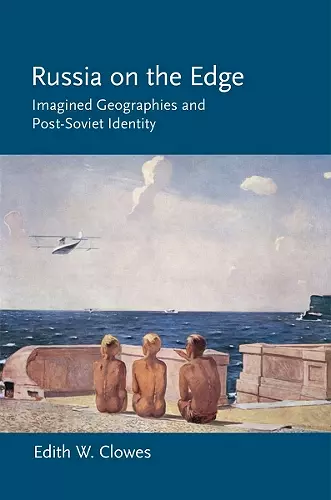Russia on the Edge
Imagined Geographies and Post-Soviet Identity
Format:Hardback
Publisher:Cornell University Press
Published:15th Apr '11
Currently unavailable, and unfortunately no date known when it will be back
This hardback is available in another edition too:
- Paperback£27.99(9780801477256)

Since the dissolution of the Soviet Union in 1991, Russians have confronted a major crisis of identity. Soviet ideology rested on a belief in historical progress, but the post-Soviet imagination has obsessed over territory. Indeed, geographical metaphors—whether axes of north vs. south or geopolitical images of center, periphery, and border—have become the signs of a different sense of self and the signposts of a new debate about Russian identity. In Russia on the Edge, Edith W. Clowes argues that refurbished geographical metaphors and imagined geographies provide a useful perspective for examining post-Soviet debates about what it means to be Russian today.
Clowes lays out several sides of the debate. She takes as a backdrop the strong criticism of Soviet Moscow and its self-image as uncontested global hub by major contemporary writers, among them Tatyana Tolstaya and Viktor Pelevin. The most vocal, visible, and colorful rightist ideologue, Aleksandr Dugin, the founder of neo-Eurasianism, has articulated positions contested by such writers and thinkers as Mikhail Ryklin, Liudmila Ulitskaia, and Anna Politkovskaia, whose works call for a new civility in a genuinely pluralistic Russia. Dugin's extreme views and their many responses—in fiction, film, philosophy, and documentary journalism—form the body of this book.
In Russia on the Edge, literary and cultural critics will find the keys to a vital post-Soviet writing culture. For intellectual historians, cultural geographers, and political scientists the book is a guide to the variety of post-Soviet efforts to envision new forms of social life, even as a reconstructed authoritarianism has taken hold. The book introduces nonspecialist readers to some of the most creative and provocative of present-day Russia's writers and public intellectuals.
"Russia on the Edge is an exceptionally innovative and insightful contribution to the literature on nationalism, national self-images, and identity in Russia today. Arguing that conceptions of 'what Russia is' depend critically on notions about where the country is located, Edith W. Clowes makes a compelling case for the new importance of 'imagined geographies' as perceptual arenas for the construction and contestation of identity in Post-Soviet Russia." -- Mark Bassin, Södertörn University
"Clowes provides a provocative reassessment of the new Russia, positing a shift from a traditional temporal historical paradigm to a spatial one. With the fall of the multinational Soviet empire where power resided in Moscow, a more diffuse situation has developed with the rise of ethnic and national identities on the geographical perimeters. Geography has partially displaced history, to the great discomfort of the central ethnic Russian populace.... In this stimulating study, Clowes discusses liberal commentators Mikhail Ryklin and Anna Politkovskaia versus Aleksandr Dugin, an ultra-nationalist... and the more diverse attitudes of 'peripheralist' writers such as Victor Pelevin and Ludmilla Ulitskaia."
"In Russia on the Edge, Edith Clowes investigates how and why borders are so central in today's Russia. She brilliantly demonstrates that much of Russian identity is defined not by what Russia is but rather where Russia is. Indeed peripheries function imaginatively as the sites of vital debates about how Russians see themselves. Clowes therefore offers a must-read analysis of how geographical and geopolitical metaphors construct post-Soviet Russian identity." -- Marlene Laruelle, The Johns Hopkins University
ISBN: 9780801448560
Dimensions: 235mm x 155mm x 19mm
Weight: 454g
200 pages